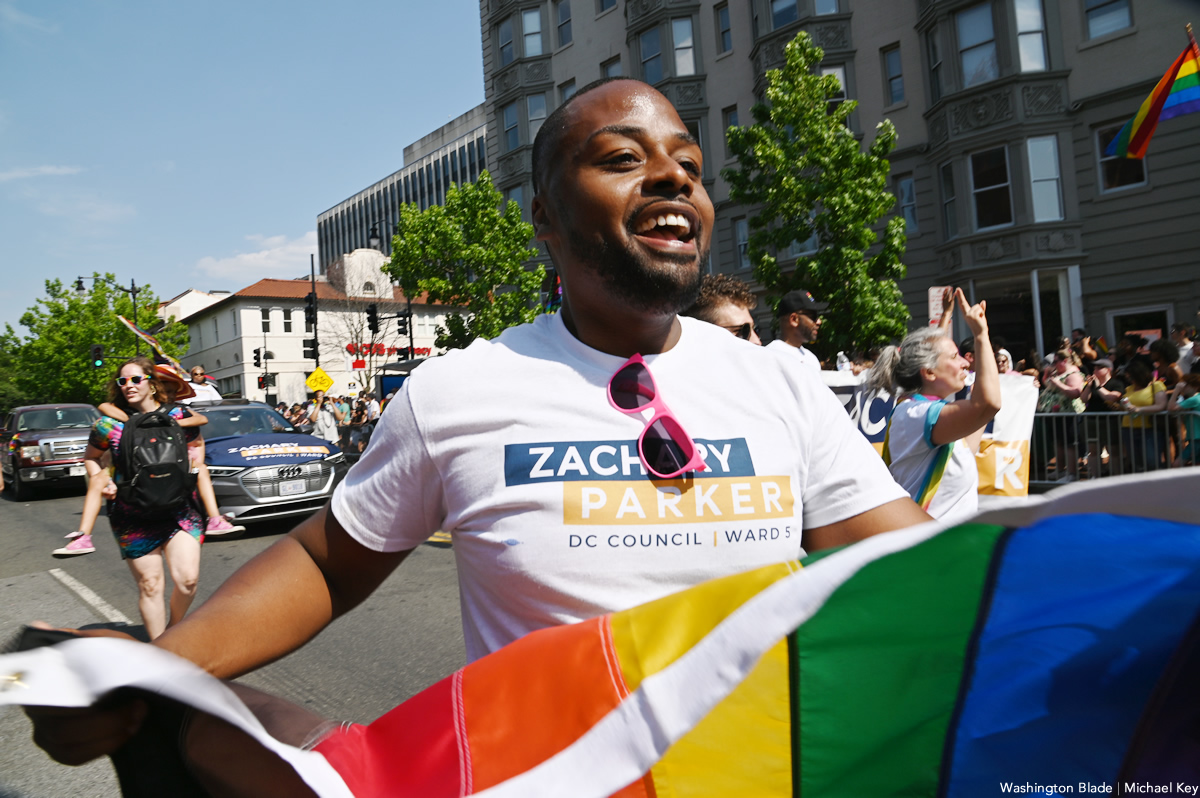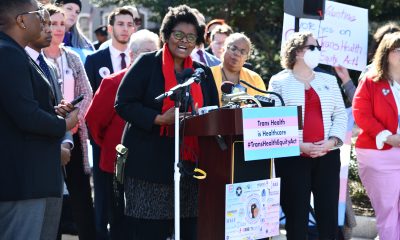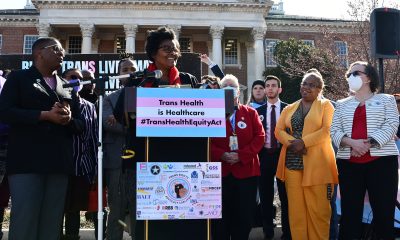Local
‘Political reality’ forces changes to Md. trans bill
Some angry over removal of public accommodations clause as hearing looms

Supporters and opponents were expected to turn out in force on March 9 for a hearing on a bill before a Maryland House of Delegates committee that calls for prohibiting discrimination against transgender people in employment and housing.
Officials with the statewide LGBT group Equality Maryland said they were hopeful that the hearing before the Health and Government Operations Committee would be the first step leading to the bill’s approval this year by the Maryland Legislature, marking a historic first for transgender rights.
But political insiders at the state capital in Annapolis said supporters were bracing for possible vocal opposition to the bill from some transgender activists, who have expressed anger over a decision by the bill’s lead sponsor to remove a provision banning discrimination in public accommodations, such as hotels, restaurants, private health clubs and gyms.
Some of the bill’s supporters worry that testimony against the bill from transgender people combined with the expected opposition from various religious leaders and social conservatives could be a devastating blow to the legislation.
Others, such as veteran transgender advocate Dana Beyer, a former candidate for a House of Delegates seat from Montgomery County, say other transgender activists such as she will voice support for the bill, countering those who oppose it.
Del. Joseline Pena-Melnyk (D-Prince George’s and Anne Arundel Counties), a strong supporter of LGBT equality who has sponsored a transgender rights bill in the legislature since 2007, said she removed the public accommodations provision this year after determining it was the only way to obtain enough votes to pass the legislation.
“The bottom line is discrimination is not right,” she told the Blade Wednesday. “I have had this bill now for over three years and initially I introduced it with the section on public accommodations, which I believe in. “
Pena-Melnyk said she determined that the “political reality” required that she make changes in the bill to line up the votes needed to pass it. She said she understands the frustration of transgender Marylanders who wanted the public accommodations provision to remain in the bill.
“But I also feel it’s the right thing to do to give people protection under the law,” she said. “It’s better than nothing. A half a load is better than no load at all.”
Equality Maryland Executive Director Morgan Meneses-Sheets said the group agrees with Pena-Melnyk’s decision to drop the public accommodations provision, with the intent of going back to the legislature next year to put public accommodations back in after the measure passes.
Noting that supporters were unable to get the bill out of committee during the past three years, Meneses-Sheets said most supporters believe an incremental strategy of advancing employment and housing protections for transgender people this year is a “far better” option than seeing the bill go down to defeat and having no protections at all.
“This helps folks right now with discrimination that they’re facing in jobs and housing,” she said. “This is a huge problem. And the housing protections are not only for housing you immediately think of like renting an apartment. In Maryland, housing is also interpreted to cover shelters.”
She noted that studies in the state show that as many as 12 percent of transgender Marylanders have experienced homelessness – sometimes due to employment discrimination that results in the loss of a job or housing discrimination resulting in the loss of an apartment.
Beyer said she, too, reluctantly has come out in support of the bill.
“The bottom line is we didn’t pass this in ‘07, we didn’t pass it in ‘08, ‘09 or last year,” she said. “So if we can get something done and we get a commitment from the community to come back next year, that’s the best we can do under the circumstances.”
Added Beyer: “It’s not ideal. We should have done it better before. But this is where we are today. People are suffering and it needs to get done.”
Beyer and others familiar with the Maryland Legislature said the decision to drop the public accommodations provision was driven by sensational claims by opponents that certain businesses like gyms and health clubs would be forced to allow male cross-dressers to use female locker rooms and bathrooms under the provision.
Those raising this concern warn that allowing male-to-female transgender people to use women’s bathroom facilities would jeopardize the safety of women, even though supporters of transgender rights legislation say such problems have not surfaced in any of the states, cities or towns that have adopted trans rights laws.
Opponents of the bill, led by some of the same anti-LGBT groups that oppose same-sex marriage, often have cited religious beliefs as grounds for denying non-discrimination protections for transgender people.
Some of the opposition to the bill from transgender activists has come from out-of-state bloggers who argue that passing a “bad” transgender law in Maryland would set a precedent that could hurt efforts to pass laws in other states.
Trans activist Monica Roberts of Texas wrote in Feb. 15 blog posting that gay and lesbian activists, led by Equality Maryland, were devoting most of their efforts to passing a same-sex marriage bill while failing to devote the attention needed to pass a stronger trans bill.
Closer to home, Sandy Rawls, a transgender activist who heads the group Trans-United, announced her opposition to the bill last month.
“Due to public outrage and disappointment of taking public accommodations out of Maryland House Bill 235, I … reviewed the facts with legal representation. As a result, Trans-United is pulling its support for the proposed legislation.”
A press conference scheduled for this week on the bill was postponed until March 9.
Maryland
What Anne Arundel County school board candidates think about book bans
State lawmakers passed Freedom to Read Act in April

BY ROYALE BONDS | Parents’ efforts to restrict content available to students in school libraries has become a contentious issue in Maryland. Conservative parent groups, such as Moms for Liberty, have been working to get books they believe are inappropriate removed from libraries in Carroll and Howard counties, sparking protests, new policies, and even a state law.
The Freedom to Read Act, passed in April, sets standards that books cannot be removed from public and school libraries due to an author’s background. Library staff that uphold the standard are protected under this act. The law, however, does not prohibit removing books deemed “sexually explicit,” the stated reason local Moms for Liberty chapters challenged school library books.
The rest of this article can be read on the Baltimore Banner website.
District of Columbia
D.C. Council member proposes change for Mayor’s Office of LGBTQ Affairs
Parker also seeks increased funding for LGBTQ programs in FY 2025 budget

D.C. Council member Zachary Parker (D-Ward 5), the Council’s only LGBTQ member, has asked his fellow Council members to support a proposal to change the Mayor’s Office of LGBTQ Affairs to become a “stand-alone entity outside the Executive Office of the Mayor to allow for greater transparency and accountability that reflects its evolution over the years.”
In an April 30 letter to each of his 12 fellow Council members, Parker said he plans to introduce an amendment to the city’s Fiscal Year 2025 Budget Support Act to make this change for the LGBTQ Affairs Office.
His letter also calls for adding to the city’s FY 2025 budget two specific funding proposals that local LGBTQ activists submitted to D.C. Mayor Muriel Bowser that the mayor did not include in her budget proposal submitted to the Council. One calls for $1.5 million to fund the completion of the build out and renovation for the D.C. Center for the LGBTQ Community’s new building in the city’s Shaw neighborhood and $300,000 in subsequent years to support the LGBTQ Center’s operations.
Parker’s second budget proposal calls for what he said was about $450,000 to fund 20 additional dedicated LGBTQ housing vouchers as part of the city’s existing program to provide emergency housing support for LGBTQ residents and other residents facing homelessness.
“The Office of LGBTQ+ Affairs currently manages about 90 vouchers across various programs and needs,” Parker said in his letter to fellow Council members. “Adding an additional 20 vouchers will cost roughly $450,000,” he wrote, adding that dedicated vouchers “play a crucial role in ensuring LGBTQ+ residents of the District can navigate the complex process of securing housing placements.”
In her proposed FY ’25 budget, Bowser calls for a 7.6 percent increase in funding for the Office of LGBTQ Affairs, which amounts to an increase of $132,000, bringing the office’s total funding to $1.7 million.
“To be clear, I support the strong work and current leadership of the Office of LGBTQ+ Affairs,” Parker says in his letter to fellow Council members. “This push for change is in recognition of the office’s notable achievements and the significant demands being placed on it, which require a greater level of accountability.”
Parker told the Blade in an April 30 telephone interview that he believes Japer Bowles, the current director of the Office of L|GBTQ Affairs is doing an excellent job in operating the office, but he believes the office would be able to do more for the LGBTQ community under the change he is proposing.
“Making it a stand-alone office versus it being clustered within the Community Affairs division of the mayor’s office, it will get more attention,” Parker told the Blade. “The leadership will have greater flexibility to advocate for the interest of LGBTQ residents, And we will be able to conduct greater oversight of the office,” he said, referring to the Council’s oversight process.
Parker noted that other community constituent offices in the mayor’s office, including the Office of Latino Affairs and the Office of Veterans Affairs are stand-alone offices that he hopes to bring about for the LGBTQ Affairs Office. He said Council member Brianne Nadeau, who chairs the Council committee that has oversight for the LGBTQ Affairs Office, has expressed support for his proposal.
Also expressing support for Parker’s proposal to make the LGBTQ Affairs Office a stand-alone office is the D.C. Advisory Neighborhood Commission Rainbow Caucus. Vincent Slatt, the caucus’s chairperson, submitted testimony last week before the D.C. Council Committee on Public Works and Operations, which is chaired by Nadeau, calling for making the LGBTQ Affairs Office a stand-alone office outside the Executive Office of the Mayor.
Slatt also stated in his testimony that the office has a “chronic staffing shortage” and recommended that at least three additional staff members be assigned to the office.
Daniel Gleick, the mayor’s press secretary, told the Blade the mayor’s office is reviewing Parker’s budget proposals, including the proposed change for the Office of LGBTQ Affairs.
Rehoboth Beach
Former CAMP Rehoboth official sentenced to nine months in prison
Salvator Seeley pleaded guilty to felony theft charge for embezzlement

Salvator “Sal” Seeley, who served as an official with the Rehoboth Beach, Del., CAMP Rehoboth LGBTQ community center for 20 years, was sentenced on April 5 by a Sussex County Superior Court judge to nine months in prison and to pay $176,000 in restitution to the organization.
The sentencing took place about five weeks after Seeley pleaded guilty to a charge of Theft in Excess of $50,000 for allegedly embezzling funds from CAMP Rehoboth, a spokesperson for the Delaware Department of Justice told the Washington Blade.
Seeley’s guilty plea came shortly after a grand jury, at the request of prosecutors, indicted him on the felony theft charge following an investigation that found he had embezzled at least $176,000 from the nonprofit LGBTQ organization.
“Salvatore C. Seeley, between the 27th day of February 2019 and the 7th day of September 2021, in the County of Sussex, State of Delaware, did take property belonging to CAMP Rehoboth, Inc., consisting of United States currency and other miscellaneous property valued at more than $50,000, intending to appropriate the same,” the indictment states.
“The State recommended a sentence of two years of incarceration based on the large-scale theft and the impact to the non-profit organization,” Delaware Department of Justice spokesperson Caroline Harrison told the Blade in a statement.
“The defense cited Seeley’s lack of a record and gambling addiction in arguing for a probationary sentence,” the statement says. “Seeley was sentenced in Superior Court to a nine-month prison term and to pay a total of $176,000 in restitution for the stolen funds,” Harrison says in the statement.
Neither Seeley nor his attorney could immediately be reached for comment.
At the time of Seeley’s indictment in February, CAMP Rehoboth released a statement saying it first discovered “financial irregularities” within the organization on Sept. 7, 2021, “and took immediate action and notified state authorities.” The statement says this resulted in the investigation of Seeley by the state Department of Justice as well as an internal investigation by CAMP Rehoboth to review its “financial control policies” that led to an updating of those policies.
“As we have communicated from day one, CAMP Rehoboth has fully cooperated with law enforcement,” the statement continues. “At its request, we did not speak publicly about the investigation while it was ongoing for fear it would jeopardize its integrity,” according to the statement. “This was extremely difficult given our commitment to transparency with the community about day-to-day operations during the recent leadership transition.”
The statement was referring to Kim Leisey, who began her job as CAMP Rehoboth’s new executive director in July of 2023, while the Seeley investigation had yet to be completed, following the organization’s process of searching for a new director. It says Seeley left his job as Health and Wellness Director of CAMP Rehoboth in September of 2021 after working for the organization for more than 20 years.
“Mr. Seeley’s actions are a deep betrayal to not only CAMP Rehoboth but also the entire community we serve,” the statement says.




















